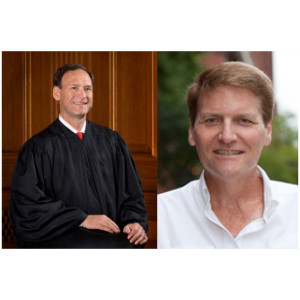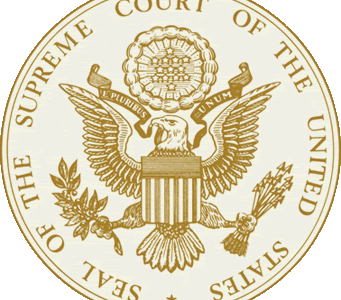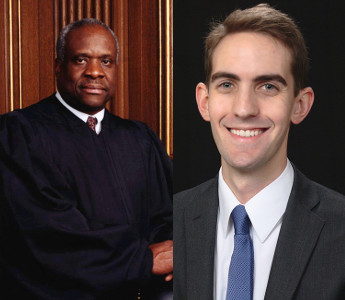Response by Professor Neil H. Buchanan
Geo. Wash. L. Rev. Docket (Oct. Term 2014)
Comptroller of the Treasury of Maryland v. Wynne et ux, 575 U.S. ___ (2015).
Docket No. 13-485; argued November 12, 2014; decided May 18, 2015
Slip Opinion | Verdict | SCOTUSblog
The State of Maryland’s income tax system is an outlier among the states. Part of that tax (which is officially collected on behalf of the county governments) does not provide a credit for taxes that Maryland residents pay to other states, on the income that is deemed to have been earned in another state. Everyone concedes that, when other states do in fact tax Marylanders’ out-of-state income, this system can result in unequal treatment of two taxpayers who are arguably similarly situated. A Marylander with, say, $1 million in taxable income that is all earned within her home state will pay less in total taxes than another Marylander with $1 million in taxable income if that second taxpayer’s income is even partly earned in another state. Notably, it is not the case that the two citizens pay different amounts of taxes to Maryland, but the second taxpayer also pays taxes to another state, and Maryland does not offset those out-of-state taxes with a credit (as other states generally do). The majority says that this is impermissible, affirming the judgment of the Maryland Court of Appeals that the Wynnes’ taxes should be recomputed after allowing such a credit.
I have described some key aspects of this case in a recent column on the Verdict website. Here, I will focus on the undeniably correct point, found in the dissents by both Justices Ginsburg and Scalia, that the majority’s analysis does not actually require Maryland to offer tax credits for out-of-state taxes. Instead, the “internal consistency test” requires only that Maryland adopt a system that, if other states all adopted it, would not create cross-border discrimination. This means that Maryland could either provide credits to its residents on out-of-state taxes or stop taxing Maryland-sourced income earned by out-of-state residents. If Maryland were to adopt the latter approach, the Wynnes’ tax bill to Maryland (including taxes paid to their home county) would not change. Importantly, this means that the cross-border tax disadvantage (essentially discouraging Marylanders from earning their income outside of the state) would also continue to exist, to exactly the same degree that it does now.
This raises a set of truly puzzling issues, none of which were addressed by any of the four opinions issued in the case. The initial matter has to do with standing. If Maryland could solve the supposed constitutional problem that motivated the complaint in a way that would leave the Wynnes’ tax bill unchanged, where is the concrete injury that is required for standing? Admittedly, the Court has in the past conferred standing where the concrete interest that has been violated is “being treated equally.”2 Yet the majority in Wynne says that equal treatment is not what is at issue. Again, Maryland could adopt a tax system that is internally consistent, and thus does not violate the DCC, even though such a system would treat the Wynnes unequally (compared to their neighbors). In the infamous Lyons chokehold case, the Court held that a person who had been injured by the police had no standing to sue to prevent the police from doing exactly what they had once done to him, because he was no more at risk than every other person in the jurisdiction to be injured in the future.3 The Wynnes, by contrast, cannot even say that the law that led to their unequal treatment is constitutionally prohibited.
Everyone knows, of course, that standing doctrine is notoriously plastic. Even assuming that there is some way to shoehorn the Wynnes into the category of injured parties, the logical problem then extends to the people who have been similarly injured by the other aspect of Maryland’s offending tax regime—to wit, out-of-state citizens who have paid taxes to Maryland on income earned in Maryland. Surely, they have an equivalent complaint: Maryland runs a tax system that violates the constitution, and such violation would be cured if Maryland completely stopped taxing non-Marylanders. Under the Wynne majority’s logic, those people should also be refunded their Maryland taxes. One might argue that some of those out-of-state residents live in states that credit the taxes paid to Maryland, such that they suffer no aggregate injury, but for those who live in states with no income tax at all, or whose tax rates are such that the Maryland tax on out-of-staters is higher than the home state’s tax, they would still experience a net gain by receiving the refund from Maryland.
Therefore, the either/or aspect of the Wynne majority’s analysis suggests an odd kind of “race to the courthouse.” If victims of one aspect of the unconstitutional system have standing, then they both have standing; but if they both have standing, then the state could be required to remedy both sets of injuries. Surely, the other parties could not be estopped from suing for their refunds merely because the Wynnes have already received theirs. Maryland would thus pay two sets of hypothetically wronged parties for the same violation, even though the violation can only affect one group to the exclusion of the other. Given that the supposed harm in this case is “double taxation,” there is more than a bit of irony in the implication that Maryland must pay double damages.
Finally, consider the ultimate purpose behind the DCC, compared to the way it ends up working under the majority’s view in this case. Constitutional law scholar Michael C. Dorf recently noted that “the modern view [in defense of the DCC] is that the Constitution has embedded within it a structural principle opposing interstate trade wars,” and that courts can enforce Congress’s presumed desire to invalidate “laws that discriminate against or unduly burden interstate commerce.”4 That strikes me as completely sensible as a descriptive matter, yet it does not support the Wynne majority’s approach, which (as I described above) allows the various states to adopt tax systems that are, in fact, encumbrances on interstate trade. In other words, the “internal consistency test,” which allows the majority to feign modesty by not ordering Maryland to adopt one system or the other, does nothing to prevent states from taxing in ways that are, in reality, discriminatory.
If Congress really cares enough about the possible cross-border disadvantages that are implied by states’ adoption of inconsistent tax laws, then it certainly has the power under the Commerce Clause to require all states to adopt systems that are actually consistent, not just hypothetically so. That Congress has never considered doing so, and that it continues to allow states to compete with each other via all manner of tax incentives, suggests that this “quintessential evil”5 (in the majority’s words) does not rise to the level of an interstate trade war. It is unclear what Maryland will do in light of this decision, but we do know that this Court would allow every state to discriminate against interstate trade, and to do so knowingly.
1. Comptroller of the Treasury of Md. v. Wynne, No. 13-485, slip op. at 2 (U.S. May 18, 2015) (Scalia, J., dissenting).
2. See Heckler v. Matthews, 465 U.S. 728 (1984).
3. City of Los Angeles v. Lyons, 461 U.S. 95 (1983).
4. Michael C. Dorf, Is the Dormant Commerce Clause a “Judicial Fraud”?, Verdict (May 20, 2015), https://verdict.justia.com/2015/05/20/is-the-dormant-commerce-clause-a-judicial-fraud.
5. Wynne, slip op. at 1 (majority opinion).
Recommended Citation
Neil H. Buchanan, Response, Comptroller of the Treasury of Maryland v. Wynne et ux, Geo. Wash. L. Rev. Docket (May 23 2015), http://www.gwlr.org/comptroller-of-the-treasury-of-maryland-v-wynne.





